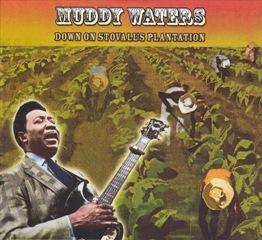Muddy Waters - Down On Stovall's Plantation (1966)
Muddy Waters - Down On Stovall's Plantation (1966)

1 - Country Blues - 3:27 2 - I Be's Troubled - 3:05 3 - Burr Clover Farm Blues - 2:55 4 - Ramblin' Kid Blues - 1:10 5 - Ramblin' Kid Blues - 3:17 6 - Rosalie - 3:02 7 - Joe Turner (Vocals – Louis Ford) - 2:46 8 - Pearlie May Blues (Vocals – Percy Thomas) - 3:24 9 - Take a Walk With Me - 3:04 10 - Burr Clover Blues - 3:13 11 - I Be Bound to Write to You (First Version) - 3:22 12 - I Be Bound to Write to You (Second Version) - 2:52 13 - You're Gonna Miss Me When I'm Gone #1 - 3:22 14 - You Got to Take Sick and Die Some of These Days - 2:08 15 - Why Don't You Live So God Can Use You? - 2:08 16 - Country Blues #2 - 3:34 17 - You're Gonna Miss Me When I'm Gone #2 - 3:41 18 - 32-20 Blues - 3:22 The Historic 1941-1942 Library of Congress Field Recordings. Tracks 1 to 3: Recorded Stovall, Mississippi, August 24-31, 1941 Tracks 4 to 8: Recorded Stovall, Mississippi, July 24, 1942 (Son Simms Four) Tracks 9 to 13: Recorded Stovall, Mississippi, July 24, 1942 Tracks 14 to 18: Recorded probably Clarksdale, Mississippi, possibly July 20-24, 1942 Muddy Waters - Guitar, Vocals Charles Berry - Guitar Louis Ford - Mandolin, Vocals Henry "Son" Sims - Guitar, Violin Percy Thomas - Guitar, Vocals Alan Lomax – Producer
These Library of Congress field recordings made by Alan Lomax from 1941-1942 feature Muddy with Percy Thomas on guitar, Louis Ford on mandolin, and Henry Sims on violin. Capturing Muddy in a string-band context playing his earliest repertoire, this is a major historical document. Unfortunately, the Universe edition of these recordings omits several interview segments with Muddy and Lomax, which most fans of this music will definitely want, making The Complete Plantation Recordings on MCA/Chess the version to own. --- Barry Lee Pearson, Rovi
In the Summer of 1941 Alan Lomax came to Stovall, Mississippi, on behalf of the Library of Congress to record various country blues musicians. “He brought his stuff down and recorded me right in my house,” Waters recalled in Rolling Stone, “and when he played back the first song I sounded just like anybody's records. Man, you don't know how I felt that Saturday afternoon when I heard that voice and it was my own voice. Later on he sent me two copies of the pressing and a check for twenty bucks, and I carried that record up to the corner and put it on the jukebox. Just played it and played it and said, `I can do it, I can do it.'” Lomax came back again in July of 1942 to record Waters again. Both sessions were eventually released as Down On Stovall's Plantation on the Testament label. --- musicians.allaboutjazz.com
download (mp3 @192 kbs):
uploaded yandex 4shared mega mediafire solidfiles zalivalka cloudmailru oboom








